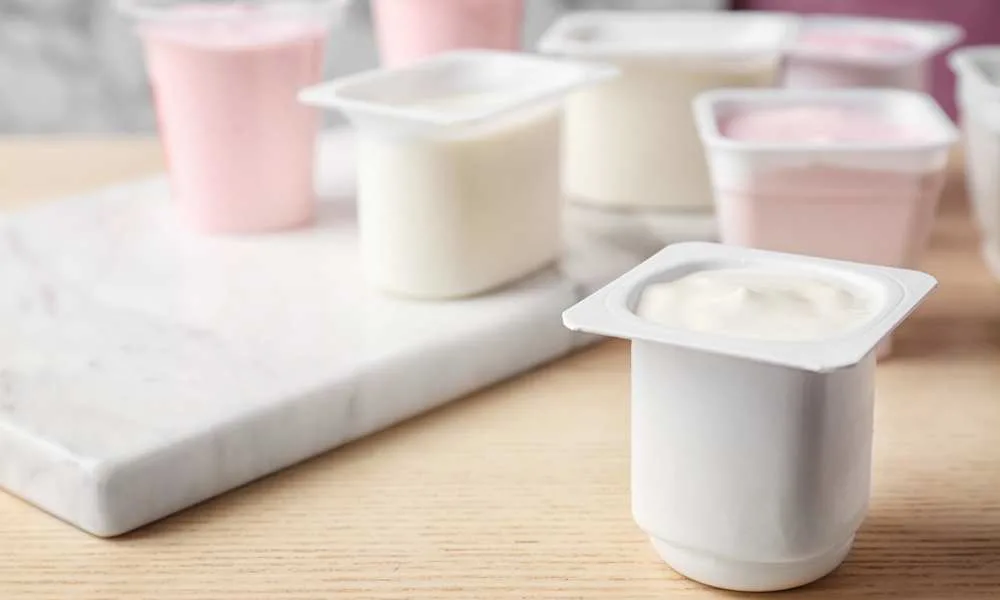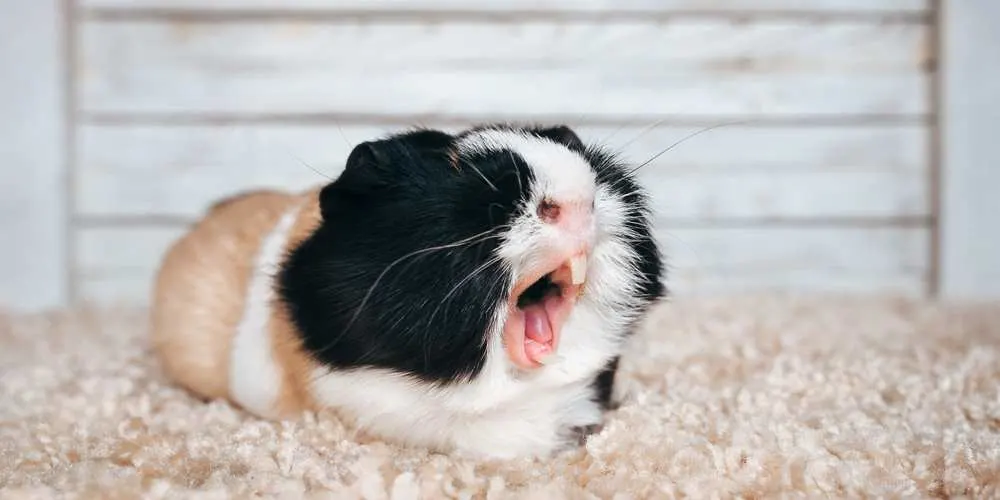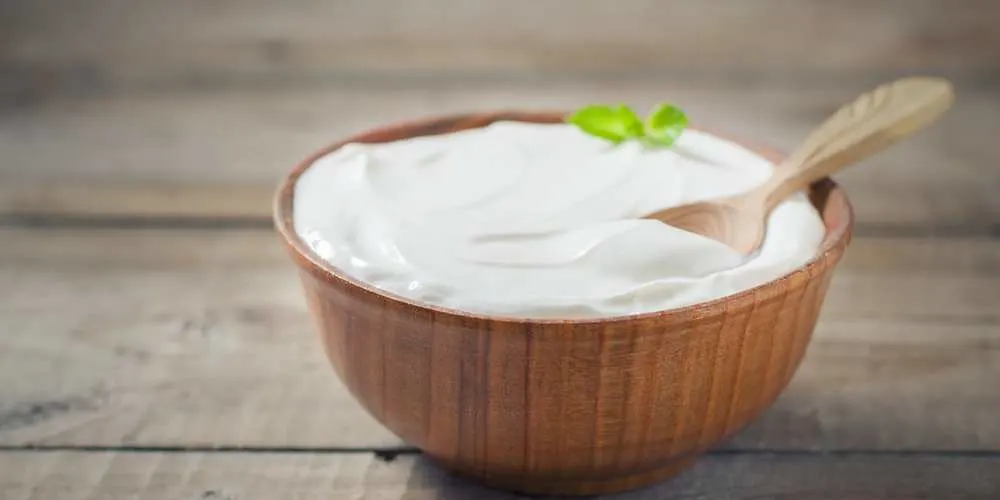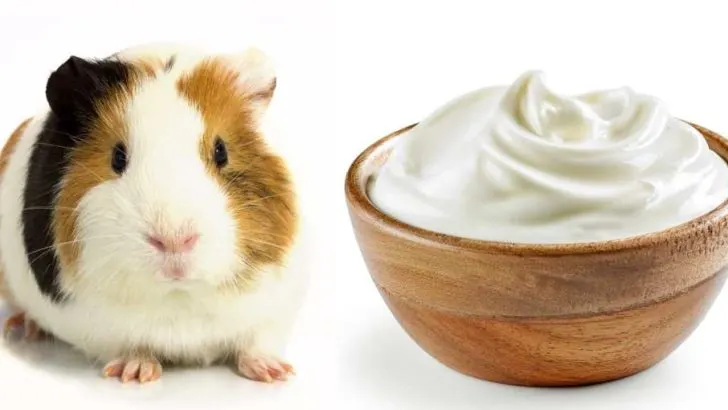Yogurt is highly nutritious, and it tastes great – it is a win-win combination hardly anyone can resist. Moreover, it is incredibly beneficial for us humans since it acts as a probiotic and keeps our digestive system healthy.
What about our little furry friends? Can guinea pigs eat yogurt too?
We are here to answer this question for you. All the info you are about to read is gathered from reliable sources so that you can be 100% sure if you should give your little piggy yogurt or not.
Let’s not waste any more of your precious time and cut right to the chase!

Can Guinea Pigs Eat Yogurt or Not?
Unfortunately, yogurt is not appropriate food for your guinea pig. The reason is relatively simple. Namely, all guinea pigs are lactose intolerant and cannot have any dairy products whatsoever.
If your piggy does eat yogurt or any other dairy product, you can expect it to have problems with its digestive system. Your pet will most probably experience some (or all) of the following symptoms:
- Cramps
- Bloating
- Gasses
- Loose stool
Even though these symptoms do not seem very dangerous and are not life-threatening, you should try to avoid giving yogurt to your guinea pigs at all costs. Why would you risk your pet’s health when there are so many other tasty things you can offer.
Yogurt might be a super-food for us humans, but guinea pigs are not that lucky. Therefore, try to keep your piggy away from this refreshing drink as well as all other dairy products.
What if you fail? What happens if your guinea pig tries some yogurt by accident?
You can relax. Having a little bit of yogurt will not endanger your pet’s life. Still, it would be best to make sure that such a scenario does not happen too often.
Your piggy has a delicate digestive system and cannot handle any processed food, sugar, or, as we have already warned you, dairy products.
Even though yogurt is not suitable for guinea pigs, you should still learn a little more about yogurt as food for the guinea pigs – its nutritional value, risks, and fun facts) – so, stay tuned!
What Are The Risks And Benefits Of Guinea Pigs Eating Yogurt?

Are There Any Health Benefits Of Guinea Pigs Eating Yogurt?
Sadly, guinea pigs cannot enjoy any benefits of otherwise quite healthy yogurt. This healthy probiotic food is good for us, but not for our cavies.
If we would forget the fact that yogurt is a dairy product, guinea pigs could enjoy the same benefits of yogurt that we humans do. Besides healthy probiotics, yogurt is packed with valuable vitamins and minerals that would boost your piggy’s immune system and help improve the health of all organs in its tiny body.
Even though there are many other foods that offer the same nutrients as yogurt and will not cause any problems for your guinea pig, almost none of them contains probiotics.
What Are The Risks Of Your Guinea Pig Eating Yogurt?
As we have already warned you, if you feed your guinea pig with yogurt, you can expect digestion issues. Yogurt contains both lactose and sugar – it is a bad combo for your piggy’s stomach. Guinea pigs are lactose intolerant and cannot handle sugars very well. Your poor furry pet will surely suffer if you persist in feeding it with yogurt.
Digestive system issues are not the only concern if you feed your pet yogurt every day. Yogurt is packed with calcium as much as any other dairy product. As a result, yogurt can interfere with your pet’s urinary system too.
Calcium is dangerous if it is found in excess in your guinea pig. If this is the case, your piggy is at significant risk of:
- Bladder and kidney stones
- Infections
- Painful urinating
- Blood in the urine
If not treated, or the levels of calcium continue to rise, things can get even worse. Your pet could face renal failure (when the kidneys stop working) and be at risk of dying prematurely.
Good to Know: Yogurt Nutrition Facts
A little bit of knowledge never hurt anyone. So, before you go, let’s learn a little bit more about yogurt.
100 g (3 oz) of plain yogurt has about 61 calories. This amount of calories is considered normal and will not cause obesity.
What Other Nutrients Are There In Yogurt?
| Carbs and proteins | Yogurt contains about 4.7 g of carbs and 3.5 g of protein in 100 g. Carbs and proteins are two primary energy sources in our body. Proteins also help us maintain a healthy weight by keeping us satiated for longer. |
| Sugar | As we have said earlier, yogurt is packed with sugar – to be precise, it contains 4.7 g of sugar in 100 g. Your tiny piggy cannot handle such a load of sugar! As a result, your piggy’s stomach would start hurting real bad. Often, guinea pigs experience severe cramps too. |
| Fat | Yogurt is relatively low in fat – only 3.3 g in 100 g. For this reason, yogurt will not contribute much to your gaining weight. |
| Vitamin C | Vitamin C in yogurt would be highly beneficial for your guinea pigs – if they could enjoy this refreshing dairy product. This vitamin is crucial for your piggy’s proper development and health. Unfortunately, guinea pigs cannot produce vitamin C on their own, nor can they store it. |
| Vitamin B1 | Vitamin B1, also known as Thiamin, is vital for the health of the brain, muscles, and nerves. It plays a role in the proper functioning of the stomach and intestines. Thiamin helps keep the heart healthy, too. |
| Vitamin B2 | Vitamin B2 is also known as riboflavin. It enhances the oxygen flow in our bodies and keeps us energized. |
| Vitamin B3 | Vitamin B3, or niacin, helps control the level of cholesterol in our blood. It plays an essential role in the prevention of diabetes and heart diseases. |
| Vitamin B6 | Vitamin B6 helps you sleep better and feel less stress during the day. It is involved in the production of the happiness hormone called serotonin. |
| Vitamin B12 | The B12 vitamin prevents anemia and helps maintain your nerves and blood cells healthy. |
| Vitamin B5 | Vitamin B5, also called pantothenic acid, is involved in the creation of new blood cells. It helps you feel energized too. |
| Calcium | Without enough calcium, our bones would not be as strong as they are. Sadly, calcium is not that good for a guinea pig’s urinary system. |
| Magnesium | The muscles must have enough magnesium to be healthy & strong. |
| Potassium | Potassium is a busy bee. It keeps the blood pressure normal and thus eliminates the risk of a stroke. It also prevents the loss of muscle mass and improves the density of bones. Potassium can hinder kidney stone formation too. |
| Zinc | Zinc is vital for our immunity. It speeds up the recovery from colds and flu. |
| Copper | Copper is responsible for the creation of red blood cells and boosts our immunity too. |
| Selenium | Selenium can aid in the prevention of some forms of cancers, and it boosts our immunity. |
Here is an easy-to-follow chart for quick reference:
| Nutrient | Amount |
|---|---|
| Calories | 61 |
| Water | 88% |
| Protein | 3.5 g |
| Carbs | 4.7 g |
| Sugar | 4.7 g |
| Fiber | 0 g |
| Fat | 3.3 g |

Final Words
Your guinea pig deserves the very best. You must make sure it gets it! Start with a balanced diet free of anything that could do your piggy harm.
Yogurt is, unfortunately, one of the things you need to avoid. Even though it is highly nutritious and has numerous vitamins and minerals that could benefit guinea pigs, you should not feed it to your pet. It can cause discomfort, digestive and urinary system issues, and you do not want that for your furry friend, don’t you!
Luckily, there are so many other things you can feed your guinea pig to help it stay healthy and happy!

